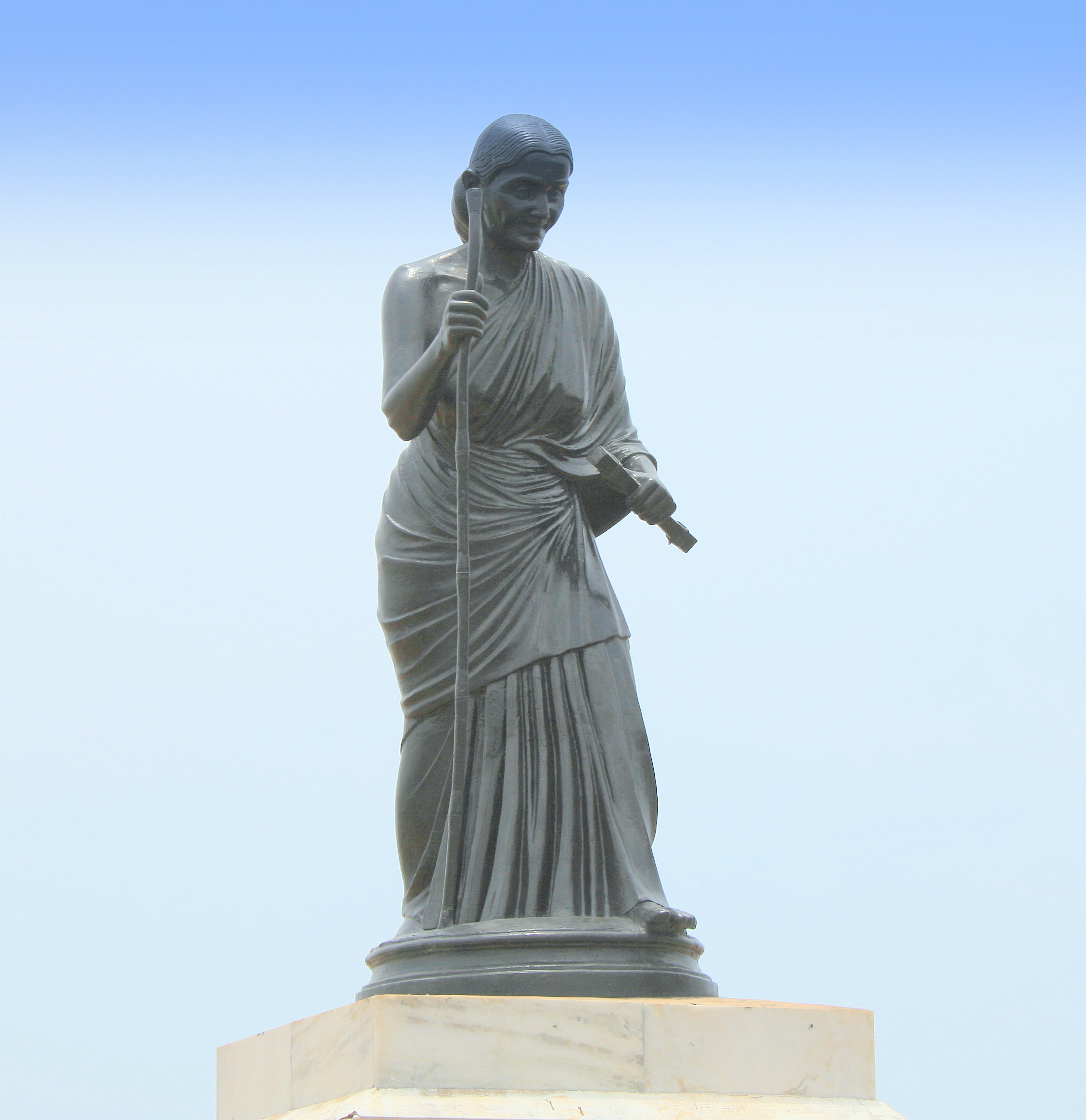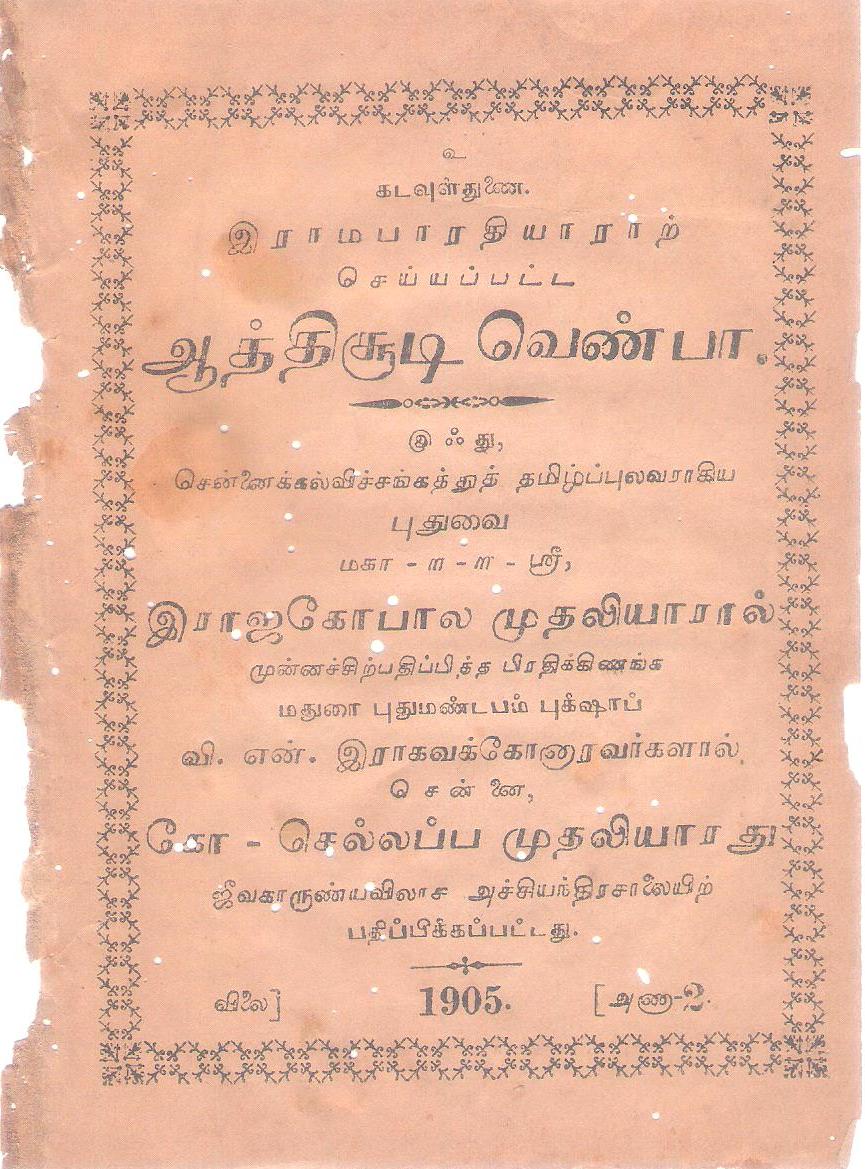|
Ramanuja Kavirayar
Ramanuja Kavirayar (1780, Ramanathapuram – 1853, Madras) was a Tamil savant and poet. Living in Madras, he dominated the world of Tamil letters and had several eminent Tamil scholars as his students. Ramanuja Kavirayar pioneered the work of bringing Tamil classics into print for the first time, and wrote commentaries on some of them. He was also a poet. His greatest service, however, like that of Minakshisundaram Pillai, was as a teacher of Tamil. He trained a band of fine native Tamil scholars and was ''guru'' or ''munshi'' (the term then current to denote language teachers) to many of the European Tamil scholars in Madras between 1820 and 1853. Early life Few details of Ramanuja Kavirayar's early life are known. His father was one Rangien as stated in a verse at the end of a Tamil translation of a Sanskrit work called ''Atmabodham''. Ramanujam was a contemporary of Ashtavadhanam Peria Saravanaperumal Kavirayar of Ramanathapuram. Both of them learnt Tamil from Somasundaram Pi ... [...More Info...] [...Related Items...] OR: [Wikipedia] [Google] [Baidu] |
Ramanathapuram
Ramanathapuram (), also known as Ramnad, is a town and a municipality in Ramanathapuram district in the Indian state of Tamil Nadu. It is the administrative headquarters of Ramanathapuram district and the second largest town (by population) in Ramanathapuram district. History The region is well known since Puranic ages. The estate of Ramnad included the Hindu holy island city of Rameswaram, from where, legend has it that the Hindu god Rama launched his invasion of Ravana's Lanka. On the conclusion of the war and Rama's success in it, he appointed a ''Sethupathi'' or "lord of the bridge" to guard the way to the island. The "bridge" referred to here is the legendary Rama's Bridge which was believed to have been constructed by Rama. The chieftains of Ramnad were entrusted with the responsibility of protecting the bridge, hence the appellation. Historically, for a short period, this area had been under the Chola Dynasty when Rajendra Chola I brought it under his territory in 1 ... [...More Info...] [...Related Items...] OR: [Wikipedia] [Google] [Baidu] |
Meenakshi Sundaram Pillai
Meenakshi Sundaram Pillai or Mahavidhvan Meenakshisundaram Pillai (Tamil:மீனாட்சிசுந்தரம் பிள்ளை) was a Tamil scholar and teacher of U. V. Swaminatha Iyer, a Tamil scholar and researcher who was instrumental in bringing many long-forgotten works of classical Tamil literature to light. Pillai's important contribution is in the form of temple history called Thala Varalaru for ninety temples in Tamil Nadu. He was born in Trichy and went on to associate himself with Thiruvaduthurai Adheenam. He was an ardent devotee of Sivaperuman and a Tamil teacher. Some of his notable works are ''Prabada Tirattu'', ''Kanthimathiammai Pillai Tamil'', ''Sri Mangalambigai Pillai Tamil'', ''Perunthipirattiyar Pillai Tamil'' and ''Thiruvidaikazhi Murugar Pillai Tamil''. Biography Meenakshi Sundaram Pillai was born on 6 April 1815 to Chidambram Pillai and Annatachi Ammayar in Somarasanpettai in Trichy. He got his early education from his father who taught ... [...More Info...] [...Related Items...] OR: [Wikipedia] [Google] [Baidu] |
Tamil Scholars
Tamil may refer to: * Tamils, an ethnic group native to India and some other parts of Asia **Sri Lankan Tamils, Tamil people native to Sri Lanka also called ilankai tamils **Tamil Malaysians, Tamil people native to Malaysia * Tamil language, natively spoken by the Tamils * Tamil script, primarily used to write the Tamil language **Tamil (Unicode block), a block of Tamil characters in Unicode * Tamil dialects, referencing geographical variations in speech See also * Tamil cinema, also known as Kollywood, the word being a portmanteau of Kodambakkam and Hollywood. * Tamil cuisine * Tamil culture, is considered to be one of the world's oldest civilizations. * Tamil diaspora * Tamil Eelam, a proposed independent state in the north and east of Sri Lanka * Tamil Nadu, one of the 28 states of India * Tamil nationalism * ''Tamil News'', a daily Tamil-language television news program in Tamil Nadu * Tamilakam, the geographical region inhabited by the ancient Tamil people, covered today's Tam ... [...More Info...] [...Related Items...] OR: [Wikipedia] [Google] [Baidu] |
1853 Deaths
Events January–March * January 6 – Florida Governor Thomas Brown signs legislation that provides public support for the new East Florida Seminary, leading to the establishment of the University of Florida. * January 8 – Taiping Rebellion: Zeng Guofan is ordered to assist the governor of Hunan in organising a militia force to search for local bandits. * January 12 – Taiping Rebellion: The Taiping army occupies Wuchang. * January 19 – Giuseppe Verdi's opera ''Il Trovatore'' premieres in performance at Teatro Apollo in Rome. * February 10 – Taiping Rebellion: Taiping forces assemble at Hanyang, Hankou, and Wuchang, for the march on Nanjing. * February 12 – The city of Puerto Montt is founded in the Reloncaví Sound, Chile. * February 22 – Washington University in St. Louis is founded as Eliot Seminary. * March – The clothing company Levi Strauss & Co. is founded in the United States. * March 4 – Inauguration of Franklin Pierce as 14th President of the U ... [...More Info...] [...Related Items...] OR: [Wikipedia] [Google] [Baidu] |
1780 Births
Year 178 ( CLXXVIII) was a common year starting on Wednesday (link will display the full calendar) of the Julian calendar. At the time, it was known as the Year of the Consulship of Scipio and Rufus (or, less frequently, year 931 ''Ab urbe condita''). The denomination 178 for this year has been used since the early medieval period, when the Anno Domini calendar era became the prevalent method in Europe for naming years. Events By place Roman Empire * Bruttia Crispina marries Commodus, and receives the title of '' Augusta''. * Emperor Marcus Aurelius and his son Commodus arrive at Carnuntum in Pannonia, and travel to the Danube to fight against the Marcomanni. Asia * Last (7th) year of ''Xiping'' era and start of ''Guanghe'' era of the Chinese Han Dynasty. * In India, the decline of the Kushan Empire begins. The Sassanides take over Central Asia. Religion * The Montanist heresy is condemned for the first time. Births * Lü Meng, Chinese general (d. 220) * Pen ... [...More Info...] [...Related Items...] OR: [Wikipedia] [Google] [Baidu] |
Commentaries In Tamil Literary Tradition
Commentaries to literary works remain one of the most important and telling aspects of the Tamil literary tradition. Commentaries to ancient Tamil works have been written since the medieval period and continue to be written in the modern era. Many ancient Tamil works continue to remain in comprehension chiefly due to exegesis or commentaries written on them. The most famous examples of such works are the Tolkappiyam and the Tirukkural, with the latter remaining the most reviewed work in the Tamil literature. Nakkeerar, Ilampooranar, Senavaraiyar, Paerasiriyar, Deivachilaiyar, Nacchinarkkiniyar, Parimelalhagar, Kalladar, and Adiyarkku Nallar remain the most celebrated commentators in the history of Tamil literature, all of whose works are praised on par with the original works to which they wrote exegeses. Background Tamil is one of the most ancient and classical languages with a rich literary tradition in the world. Along with Sanskrit, it remains one of the languages of ... [...More Info...] [...Related Items...] OR: [Wikipedia] [Google] [Baidu] |
Pachaiyappa Mudaliar
Vallal Pachaiyappa Mudaliar (1754–1794) or Arcot Pachayyappa Mudaliar was a Madras merchant, philanthropist, and dubash of the 18th century. Commemorative stamp on Vallal Pachaiyappa was released 31 March 2010. Early life Vallal Pachaiyappa Mudaliar was born to Visvanatha Mudaliar of Tuluva Vellala (Agamudaya) community in Periyapalaiyam in Thiruvallur district. Invited to Madras by dubash Narayana Pillai, he became a ''dubash'' at the age of 16 and amassed a fortune by the time he was 21. Ramanuja Kavirayar had written Pancharatnamala on Pachaiyappa Mudaliar. As dubash A protégé of Narayana Pillai, Vallal Pachaiyappa Mudaliar rose to dubash-ship soon after the demise of his mentor. During the same time, his employers the Powney family comprising the brothers Henry Powney and Thomas Powney rose to Mayorship of Madras. This increased the stature of Vallal Pachaiyappa Mudaliar and he emerged as one of the richest and most powerful men in Madras city. Lifestyle De ... [...More Info...] [...Related Items...] OR: [Wikipedia] [Google] [Baidu] |
Avvaiyar
Avvaiyar (Tamil: ஔவையார்) was the title of more than one female poet who were active during different periods of Tamil literature. They were some of the most famous and important female poets of the Tamil canon. Abidhana Chintamani states that there were three female poets titled ''Avvaiyar''. Among them, the first Avvaiyar lived during the Sangam period (c. 3rd century BCE) and is said to have had cordial relations with the Tamil chieftains Vēl Pāri and Athiyamān. She wrote 59 poems in the Puṟanāṉūṟu. Avvaiyar II lived during the period of Kambar and Ottakoothar during the reign of the Chola dynasty in the tenth century. She is often imagined as an old and intelligent lady by Tamil people. Many poems and the Avvai Kural, comprising 310 kurals in 31 chapters, belong to this period. The third Avvaiyar is the most widely known for her 'Vinayagar Agaval', 'Aathichoodi', 'Kondrai Vendhan', ' Nalvazhi' and ' Moodhurai'. Name etymology The name Avvaiyar ... [...More Info...] [...Related Items...] OR: [Wikipedia] [Google] [Baidu] |
Aathichoodi
The Athichudi ( ta, ஆத்திசூடி, translit=Āthichūdi) is a collection of single-line quotations written by Avvaiyar Avvaiyar (Tamil: ஔவையார்) was the title of more than one female poet who were active during different periods of Tamil literature. They were some of the most famous and important female poets of the Tamil canon. Abidhana Chinta ... and organized in alphabetical order. There are 109 of these sacred lines which include insightful quotes expressed in simple words. It aims to inculcate good habits, discipline and doing good deeds. Description English translation of உயிர் வருக்கம் English translation of உயிர்மெய் வருக்கம் English translation of ககர வருக்கம் English translation of சகர வருக்கம் English translation of தகர வருக்கம் English translation of நகர வருக்கம் English t ... [...More Info...] [...Related Items...] OR: [Wikipedia] [Google] [Baidu] |
Madras
Chennai (, ), formerly known as Madras ( the official name until 1996), is the capital city of Tamil Nadu, the southernmost Indian state. The largest city of the state in area and population, Chennai is located on the Coromandel Coast of the Bay of Bengal. According to the 2011 Indian census, Chennai is the sixth-most populous city in the country and forms the fourth-most populous urban agglomeration. The Greater Chennai Corporation is the civic body responsible for the city; it is the oldest city corporation of India, established in 1688—the second oldest in the world after London. The city of Chennai is coterminous with Chennai district, which together with the adjoining suburbs constitutes the Chennai Metropolitan Area, the List of urban areas by population, 36th-largest urban area in the world by population and one of the largest metropolitan economies of India. The traditional and de facto gateway of South India, Chennai is among the most-visited Indian cities by f ... [...More Info...] [...Related Items...] OR: [Wikipedia] [Google] [Baidu] |
Parimelalhagar
Parimelalhagar ( ta, பரிமேலழகர்) (), sometimes spelled Parimelazhagar, born Vanduvarai Perumal, was a Tamil poet and scholar known for his commentary on the ''Thirukkural''. He was the last among the canon of ten medieval commentators of the Kural text most highly esteemed by scholars. He was also among the five oldest commentators whose commentaries had been preserved and made available to the Modern era, the others being Manakkudavar, Pari Perumal, Kaalingar, and Paridhi. Of all the ancient commentaries available of the Kural literature, Parimelalhagar's commentary is considered by scholars as the best both in textual and in literary aspects. The codification of the writings of Valluvar is attributed to Parimelalhagar. Parimelalhagar also remains the most reviewed, in terms of both praise and criticism, of all the medieval Kural commentators. Praised for its literary richness and clarity, Parimelalhagar's commentary is considered highly complex and exquisite ... [...More Info...] [...Related Items...] OR: [Wikipedia] [Google] [Baidu] |
_-_Copy.jpg)





.jpg)